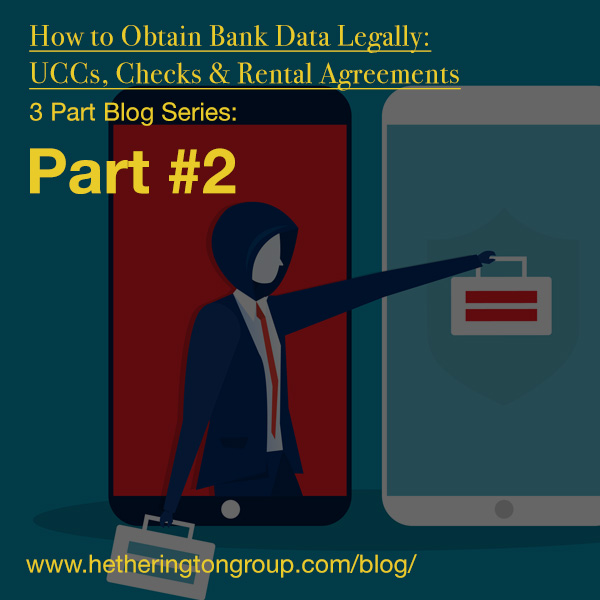By Cynthia Hetherington, MLS, MSM, CFE, CII

It’s no secret that bank account information isn’t as accessible to legal professionals, credentialed investigators, and asset due diligence researchers as other personal information. If it were merely expensive or inconvenient to obtain this information, professional information aggregators such as LexisNexis and Thomson Reuters would be able to hawk asset databases at their conference vendor booths, and we’d all be lining up in droves to subscribe.
After all, nothing tells a story like someone’s financial information. But at times, it can feel like trying to find a needle in a haystack.
In this 3-part series, we share the means and methods Hg’s expert investigative analysts employ when trying to track down financial data related to bank accounts. This week, we discuss Uniform Commercial Code Documents and Landlords and Rental Property Records.
Uniform Commercial Code Documents and Records
A search should be made of Uniform Commercial Code (UCCs) filings. UCC documents are business loans outlining items secured by a bank for the purposes of lending money. The bank that loaned the subject money may be the same bank he or she uses personally. It only makes sense: The subject will likely have a better chance of obtaining a loan from a bank he or she already has a banking relationship with. Once the subject’s bank is identified, you have a better chance of obtaining the subject’s bank account.
Keep in mind the purpose of a UCC-1 filing: As per the New Jersey Division of Revenue, “A UCC-1 records and protects a secured party’s interest in the collateral offered by a debtor for a loan. In essence, the UCC-1 gives public notice relative to the debtor-secured party relationship and the collateral involved.”
A UCC-1 filing provides notice to the public that the secured party has an interest in the subject’s property. Typically, this is the secured party loaning money to the debtor. The subject fills out a loan application and financial statement, which should also contain the subject’s bank account information.
UCCs are easily located via Secretary of State or State Business Registry databases found online. Public record aggregators also offer UCC searches for a nominal fee.
Checks between the Secured Party & the Subject
In a loan situation, the bank will issue a check to the subject. The subject will deposit the check in his or her bank account. As the check makes its way back to the issuing bank, the subject’s bank account number will be on the back of the check issued by the bank. If you subpoena the secured party for a copy of this check, it will show the document trail—including the name and account number of the bank into which the subject actually deposited the check.
Additionally, the subject is obligated to pay the secured party back for its loan each month, possibly with a check. Subpoena the targeted bank for any loan applications and/or financial statements of the debtor, any checks the bank issued to the debtor, and the subject’s checks over a period of several months.
Landlords and Rental Properties
Subpoena the subject’s previous landlord for a copy of the rental application to see where the subject banked. Most people are creatures of habit: Once a banking relationship is established, it generally continues uninterrupted. Additionally, the current landlord likely has a rental application on file that show the subject’s bank account.
If the subject’s rental application information is outdated, try to obtain the security deposit/cleaning refund check that was given to the subject/tenant upon move out. The subject may have deposited that check in his/her bank account. The landlord or the landlord’s bank will have a copy of that check; the subject’s bank account information should be on the check’s backside.
During the rental period, the subject/tenant likely paid rent by check. The landlord might claim he does not have access to these checks—which may be true. However, the bank microfilmed every check the landlord deposited in his account, including the subject/tenant’s rent checks. The landlord may cooperate, or you may have to subpoena him to obtain past and current rent checks.
Next Up …
Check back next week, as we continue this series with Yard Sales and Dumpster Diving.

Are you an analyst or investigator looking for advanced #OSINT training ? If so, check out Hg’s webinar series, where you can attend live sessions and receive CEUs or watch previously recorded sessions to beef up your investigative skills.

Are you interested in working with an international company but unsure if it’s legitimate? As veteran investigators in global due diligence, Hg understands the business world and the legal and regulatory frameworks in which corporations and privately held companies operate. Our skilled analysts excel at exposing financial risks, reputational issues, criminal activity, and legal actions detrimental to your personal and business stability. Learn how our team can arm you with the data you need.
 Cynthia Hetherington, MLS, MSM, CFE, CII is the founder and president of Hetherington Group, a consulting, publishing, and training firm that leads in due diligence, corporate intelligence, and cyber investigations by keeping pace with the latest security threats and assessments. She has authored three books on how to conduct investigations, is the publisher of the newsletter, Data2know: Internet and Online Intelligence, and annually trains thousands of investigators, security professionals, attorneys, accountants, auditors, military intelligence professionals, and federal, state, and local agencies on best practices in the public and private sectors.
Cynthia Hetherington, MLS, MSM, CFE, CII is the founder and president of Hetherington Group, a consulting, publishing, and training firm that leads in due diligence, corporate intelligence, and cyber investigations by keeping pace with the latest security threats and assessments. She has authored three books on how to conduct investigations, is the publisher of the newsletter, Data2know: Internet and Online Intelligence, and annually trains thousands of investigators, security professionals, attorneys, accountants, auditors, military intelligence professionals, and federal, state, and local agencies on best practices in the public and private sectors.



